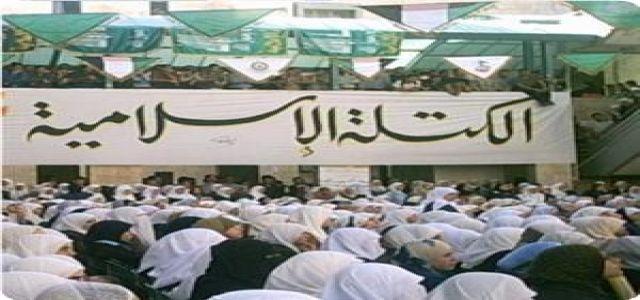- ActivitesIslamic MovementsPalestine
- April 19, 2009
- 6 minutes read
Hamas gains ground in university poll with wider echoes

The main contenders in this week”s student elections at Birzeit University, a barometer for decades of Palestinian public opinion, marched into battle like rival armies.
First came hundreds of supporters of Hamas, the Islamist Palestinian group, lined up military-style in neat rows, and strictly separated into columns of men and women. Holding aloft a sea of bright green banners, the young Islamists chanted “Allahu akbar” (Allah is great) as they entered the university”s main square. Behind them marched an even larger contingent of students supporting the rival Fatah movement, waving yellow flags and chanting praise for Yassir Arafat, the former Palestinian leader.
Waiting in the midday heat were thousands of students ready to hear the final debate of a contest followed and analysed far beyond the confines of Birzeit”s campus. Located on a hilltop in the heart of the Israeli-occupied West Bank, the university is the closest thing to a Palestinian Harvard – a place of academic excellence and a training ground for the future Palestinian elite.
Followed closely by the media, the annual elections to Birzeit”s student parliament serve as a crucial test of Palestinian political sentiment. This year, they showed what pollsters have been predicting for months: that support for Hamas is once again on the rise.
Fatah went into the elections with a comfortable five-seat lead in the student parliament. A day after the debate, with the votes of almost 7,000 students counted, the secular movement came out on top once again – but its lead was cut. Of the 51 seats, Fatah now holds 24 and Hamas 22 – confirming the expectation that the Gaza war would boost the Islamists” support.
Birzeit has held annual elections since its foundation in the 1970s, long before opinion polls and real parliamentary elections took hold in the occupied territories. Student politics at the university has provided a springboard for future Palestinian leaders such as Marwan Barghouthi, the jailed figurehead of the young Fatah guard. The student ballot “is probably the most free and democratic election in our country”, says Ghassan Khatib, a political analyst and vice-president of the university. He says it has a “unique position in the Palestinian movement”, not least by virtue of the university”s history as a hotbed of political activity. “People here have a long tradition of freedom of expression, so this is a real test of public opinion,” says Mr Khatib.
“All the people outside the university pay attention to see who will lead the student union. It indicates what is going on in society,” says Ahemd Zaytoun, an information technology student.
For Hamas supporters such as Mr Zaytoun, the elections are also important for a different reason: in the West Bank, which is governed by the Fatah-controlled Palestinian Authority, there are precious few opportunities to fly the Islamist flag.
As the debate between candidates makes clear, this election is not about tuition fees or the quality of canteen food. Instead, it precisely mirrors the larger political rift between Hamas and Fatah – which broke out into bloody violence when Hamas fighters ousted the Fatah-led PA from the Gaza Strip almost two years ago.
Both parties are currently engaged in talks aimed at mending the schism and bringing in a new unity government. But, with the exception of a few places such as Birzeit, the crackdown on political activities by Hamas in the West Bank and Fatah in Gaza continues.
Najib Mafarjeh, the charismatic leader of the Islamist bloc, is the first to speak. He praises the stance of Hamas during the recent Gaza war, which will serve as a template for the group”s activities in the West Bank and Birzeit. “We won in Gaza,” he shouts, to wild cheers from his supporters. “We will win again here.”
Ahed Hamdan, his Fatah counterpart, hits back, insisting the “victory” was not one of Hamas, but of all Palestinian people. Neither he nor other speakers dare question whether the bloody three-week conflict was indeed a victory, least of all for Gaza”s battered people.
According to Mr Khatib, the results mirror closely the political sentiment among most Palestinians in the West Bank: Hamas”s popularity, even on the genteel and privileged campus of Birzeit, is on the rise.



